By Leen Randell
Updated: Jul 04, 2024
10 Best Herbal Decoctions For Open Wounds
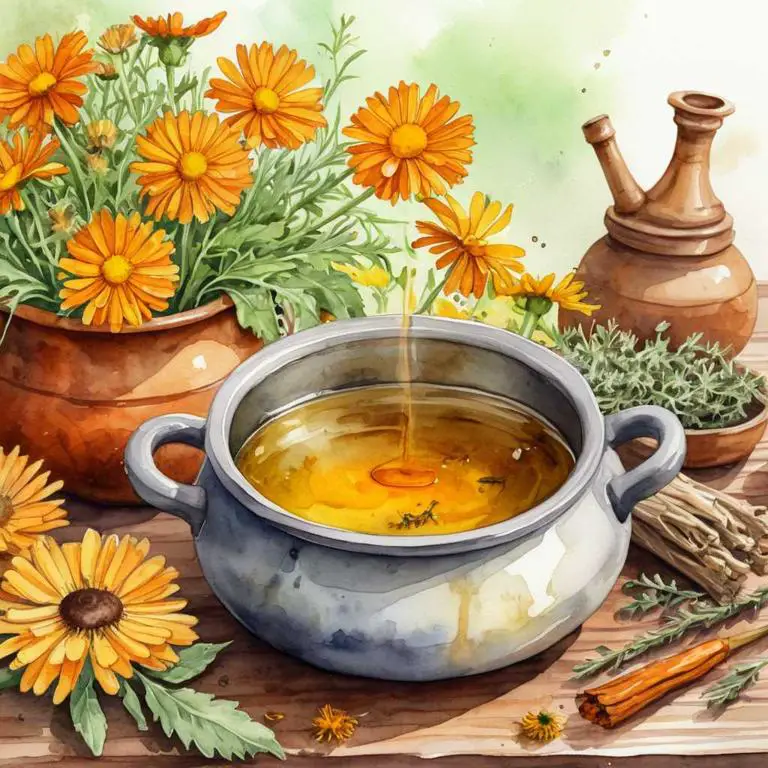
Herbal decoctions for open wounds are a traditional remedy used to promote healing, reduce inflammation, and prevent infection in minor cuts and scrapes.
These natural solutions involve steeping herbs like goldenseal, calendula, and chamomile in hot water to create a soothing liquid that can be applied topically to the affected area. By using herbal decoctions, individuals can experience faster wound closure, reduced scarring, and improved overall health.
For example, applying a chamomile decoction to a minor cut can help reduce redness and inflammation, allowing for a smoother recovery process.
The following article describes in detail the most important decoctions for open wounds, including medicinal properties, parts of herbs to use, and recipes for preparations.
- 1. Calendula officinalis
- 2. Hypoxis hemerocallidea
- 3. Ginkgo biloba
- 4. Hypericum perforatum
- 5. Allium cepa
- 6. Artemisia absinthium
- 7. Taraxacum officinale
- 8. Cinchona officinalis
- 9. Plantago major
- 10. Aloe vera
- What is the best combination of herbal decoctions to use for open wounds?
- What ailments similar to open wounds are treated with herbal decoctions?
1. Calendula officinalis
Pot marigold decoctions helps with open wounds because of its antimicrobial, anti-inflammatory, and antiseptic properties.
The flavonoids and phenolic acids present in the decoction inhibit the growth of bacteria, viruses, and fungi that can infect open wounds, promoting a healthy environment for healing. Additionally, the decoction's antioxidant properties help to reduce oxidative stress and inflammation, which can impede the wound healing process.
By using pot marigold decoctions as a topical treatment, individuals with open wounds may experience improved wound closure rates and reduced scarring.
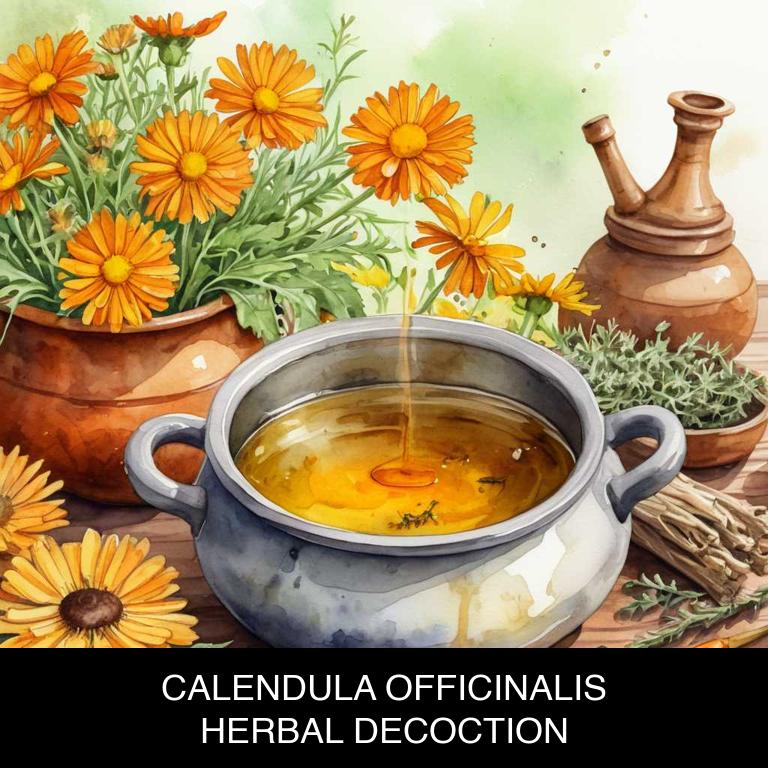
Medicinal Constituents
The list below shows the primary medicinal constituents in Calendula officinalis decoctions that help with open wounds.
- Triterpenoid saponins: These compounds help with wound healing by reducing inflammation and promoting tissue repair through their anti-inflammatory and antioxidant properties.
- Phenolic acids: These compounds exhibit antimicrobial properties that prevent infection and promote wound healing by inhibiting the growth of bacteria and other pathogens.
- Carotenoids: These compounds possess antioxidant properties that help protect wounds from oxidative stress, promote tissue repair, and reduce the risk of infection.
Parts Used
The list below shows the primary parts of pot marigold used to make decoctions for open wounds.
- Flowers: The flowers of Calendula officinalis are primarily used due to their high content of anti-inflammatory and antimicrobial compounds, which aid in the healing and protection of open wounds.
- Leaves: The leaves of Calendula officinalis contain antioxidants and flavonoids, which help to soothe and protect the skin while promoting tissue repair in open wounds.
- Roots: The roots of Calendula officinalis are utilized due to their anti-inflammatory and antimicrobial properties, which contribute to the accelerated healing of open wounds and prevention of infection.
Quick Recipe
The following recipe gives a procedure to make a basic pot marigold for open wounds.
- Harvest 1 cup of fresh calendula officinalis flowers or 2 tablespoons of dried flowers in the morning.
- Rinse the flowers with cold water and pat them dry with a clean towel immediately.
- Combine the fresh flowers with 2 cups of boiling water in a heat-resistant glass cup now.
- Steep the mixture for 5 to 10 minutes or bring to a boil and reduce heat to simmer for 10 minutes then.
- Strain the decoction through a cheesecloth or a fine-mesh sieve into a clean glass container finally.
2. Hypoxis hemerocallidea
Star grass decoctions helps with open wounds because of its remarkable antibacterial, anti-inflammatory, and antifungal properties.
The decoction's active compounds, such as cinnamic acid and sesquiterpenes, work synergistically to prevent infection, reduce swelling, and promote wound healing.
By creating a protective barrier on the affected area, star grass decoctions also help to maintain a healthy environment for new tissue growth, accelerating the natural healing process and reducing the risk of complications or delayed recovery.
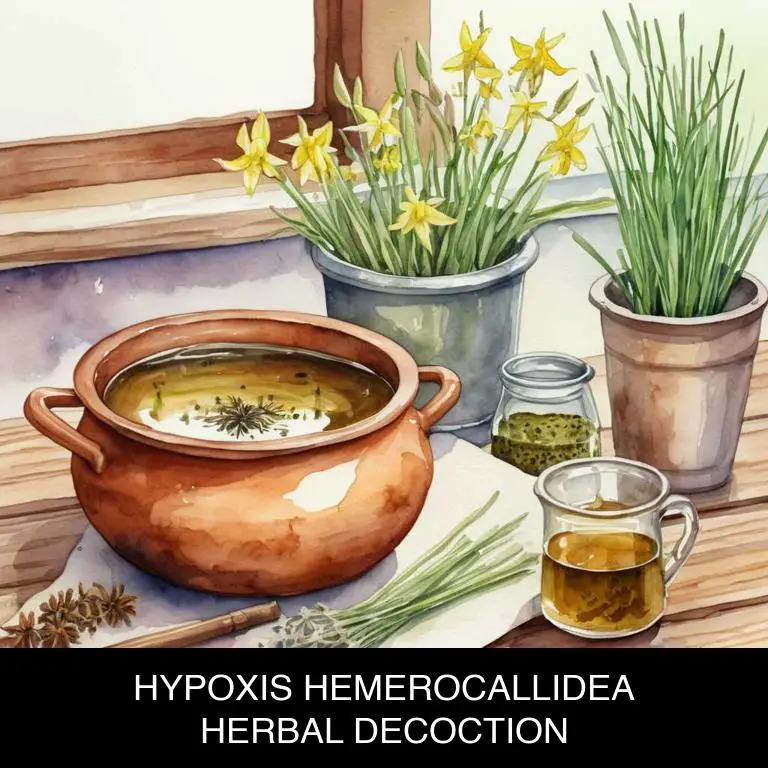
Medicinal Constituents
The list below shows the primary medicinal constituents in Hypoxis hemerocallidea decoctions that help with open wounds.
- Saponins: Saponins help with open wounds by reducing inflammation, promoting wound healing, and exhibiting antimicrobial properties that prevent infection.
- Glycosides: Glycosides have been found to exhibit antioxidant and anti-inflammatory properties, which aid in wound healing by reducing oxidative stress and inflammation in the wound area.
- Terpenoids: Terpenoids in Hypoxis hemerocallidea decoctions exhibit antimicrobial and anti-inflammatory properties, which help prevent infection and promote wound healing by reducing inflammation and promoting tissue repair.
Parts Used
The list below shows the primary parts of star grass used to make decoctions for open wounds.
- Roots: The root is the primary part used due to its high concentration of active compounds, such as hemerocallin and other glycosides, which exhibit anti-inflammatory and antimicrobial properties.
- Barks: The bark is used due to its content of bioactive compounds, such as phenolic acids and flavonoids, which exhibit antimicrobial and anti-inflammatory properties, promoting wound healing.
Quick Recipe
The following recipe gives a procedure to make a basic star grass for open wounds.
- Gather 1-2 kg of dried hypoxis hemerocallidea roots and clean them thoroughly to remove any debris.
- Crush the cleaned roots into smaller pieces using a mortar and pestle to increase their surface area.
- Combine the crushed roots with 5 liters of water and bring the mixture to a boil in a large pot.
- Reduce the heat and simmer the mixture for 15-20 minutes to allow the active compounds to infuse.
- Strain the decoction through a cheesecloth or a fine-mesh sieve into a clean container to remove the solids.
3. Ginkgo biloba
Maidenhair tree decoctions helps with open wounds because of its remarkable anti-inflammatory, antibacterial, and antifungal properties.
The decoction's extracts, such as adiantum capillus-veneris, contain compounds that stimulate collagen production, promoting tissue regeneration and wound healing. Additionally, the decoction's antimicrobial agents help to prevent infection, reducing the risk of sepsis and promoting a healthy environment for wounds to close.
As a result, maidenhair tree decoctions have been traditionally used to treat various types of open wounds, including burns, cuts, and ulcers, with promising results.
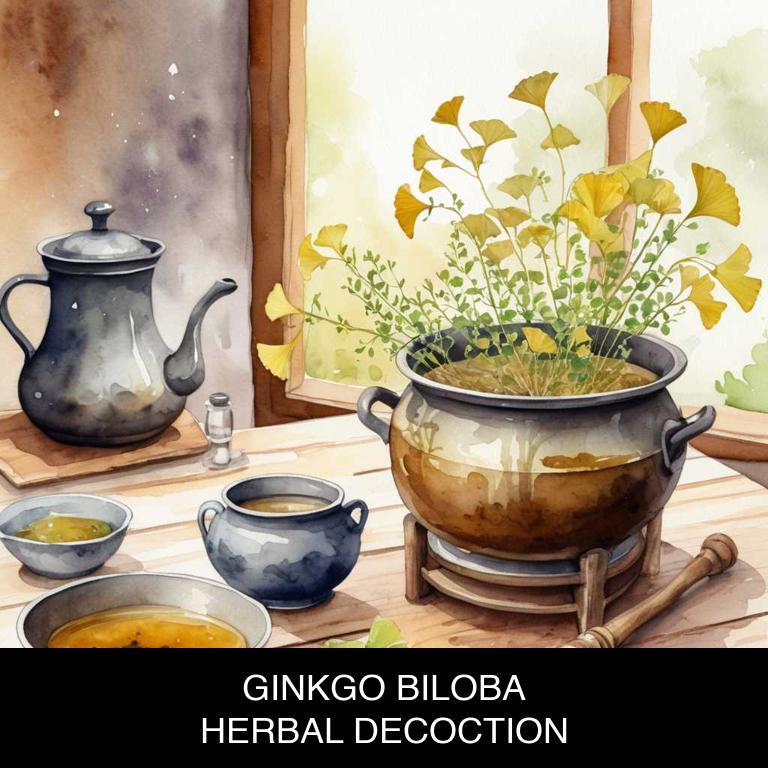
Medicinal Constituents
The list below shows the primary medicinal constituents in Ginkgo biloba decoctions that help with open wounds.
- Bilobalide: A triterpene sesterterpene that helps with wound healing by promoting cell proliferation and differentiation, contributing to the acceleration of the wound healing process.
- Quercetin: A flavonoid phenolic compound that exhibits potent anti-inflammatory properties, reducing oxidative stress and promoting tissue repair in open wounds.
- Isorhapontigenin: A lignan phenolic compound that shows antimicrobial activity, helping to prevent infection and promote a favorable environment for wound healing.
Parts Used
The list below shows the primary parts of maidenhair tree used to make decoctions for open wounds.
- Leaves: Used for their antioxidant and anti-inflammatory properties to promote wound healing and tissue repair.
- Barks: Utilized for their antimicrobial and anti-inflammatory properties to prevent infection and promote wound closure.
- Roots: Employed for their antimicrobial and anti-inflammatory properties to aid in wound healing and protect against infection.
Quick Recipe
The following recipe gives a procedure to make a basic maidenhair tree for open wounds.
- Harvest 10-20 ginkgo biloba leaves from a trusted source in the morning when they are fresh and plump.
- Dry the ginkgo biloba leaves in a single layer at 40-50 degrees celsius for 2-3 hours.
- Crush 1-2 teaspoons of dried ginkgo biloba leaves into a fine powder using a coffee grinder or mortar.
- Steep 1 teaspoon of ginkgo biloba powder in 1 cup of boiling water for 5-10 minutes.
- Strain the decoction and discard the solids before drinking 1-2 cups of the liquid per day.
4. Hypericum perforatum
St John's Wort decoctions helps with open wounds because of its potent antibacterial, anti-inflammatory, and antiseptic properties.
The plant's flavonoids and hypericin content have been shown to accelerate wound healing by stimulating collagen synthesis, improving tissue oxygenation, and reducing swelling and pain.
Additionally, the antimicrobial activity of St John's Wort decoctions helps to prevent infection and promote a healthy environment for wound closure, making it a valuable adjunctive therapy in wound care management.
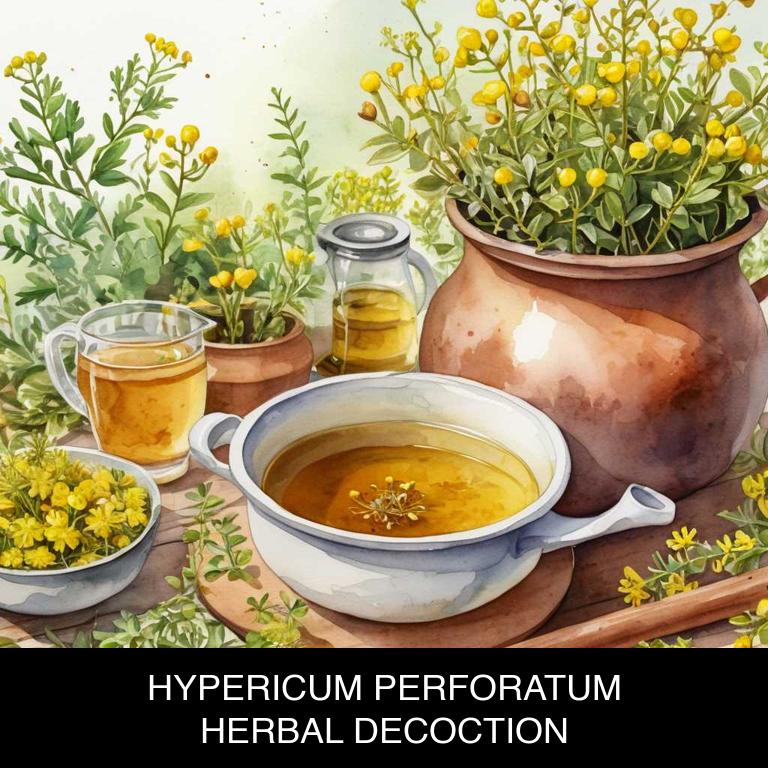
Medicinal Constituents
The list below shows the primary medicinal constituents in Hypericum perforatum decoctions that help with open wounds.
- Naphthoquinones: These compounds exhibit potent antimicrobial properties, helping to prevent infection and promote wound healing by reducing the growth of bacteria and fungi.
- Flavonoids: These flavonoids possess anti-inflammatory properties, reducing swelling and promoting tissue repair by inhibiting the production of pro-inflammatory enzymes and cytokines.
- Phenolic acids: These compounds have antioxidant and antimicrobial properties, protecting the wound from oxidative stress and infection by scavenging free radicals and inhibiting the growth of microorganisms.
Parts Used
The list below shows the primary parts of st john's wort used to make decoctions for open wounds.
- Leaves: They contain hypericin and hyperforin, which have antiseptic and antimicrobial properties to help prevent infection.
- Buds: They have a high concentration of hypericin and hyperforin, making them effective in reducing the risk of infection and promoting wound healing.
- Stems: The stem parts contain flavonoids and phenolic acids, which contribute to their antiseptic and anti-inflammatory properties, aiding in the healing process.
Quick Recipe
The following recipe gives a procedure to make a basic st john's wort for open wounds.
- Harvest 1 to 2 pounds of the aerial parts of the plant in the flowering stage in mid to late summer.
- Dry the harvested plant material in a warm dark place for 7 to 10 days to reduce moisture content.
- Grind the dried plant material into a fine powder using a mortar and pestle to enhance extraction efficiency.
- Steep 1 to 2 teaspoons of the powdered plant material in 1 cup of boiling water for 10 to 15 minutes to create the decoction.
- Strain the decoction using a cheesecloth or a fine-mesh sieve to remove the plant material before consumption.
5. Allium cepa
Onion decoctions helps with open wounds because they possess antimicrobial and anti-inflammatory properties that accelerate healing.
The decoction's natural antibacterial agents, such as quercetin and kaempferol, inhibit the growth of bacteria, promoting a clean environment for wound closure. Additionally, onion's antioxidants and flavonoids reduce inflammation, which can impede the body's natural healing process.
By applying the decoction topically, it helps to stimulate collagen production, enhance tissue repair, and promote a faster recovery from open wounds.
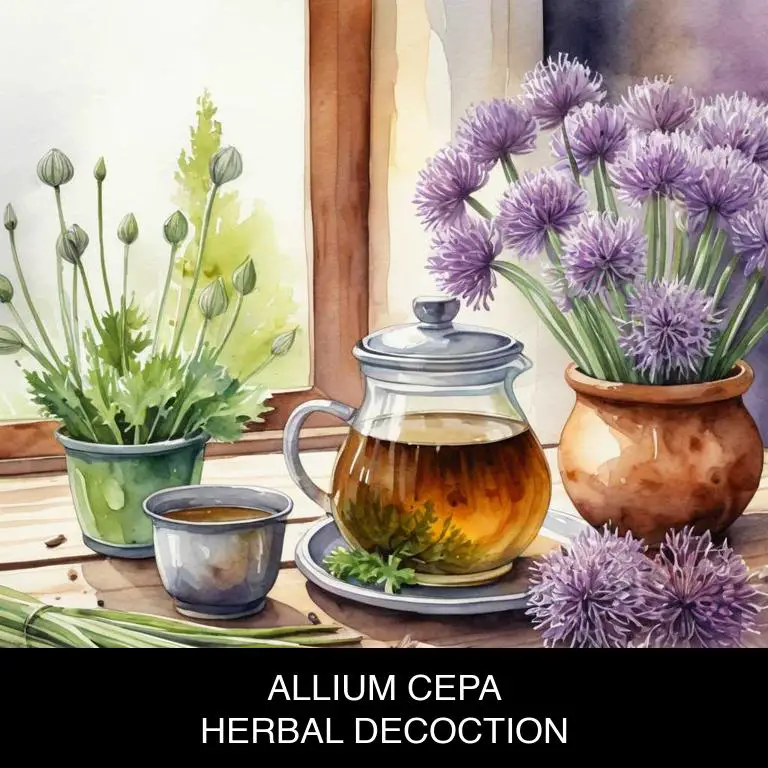
Medicinal Constituents
The list below shows the primary medicinal constituents in Allium cepa decoctions that help with open wounds.
- Alliin: Alliin has been found to possess antimicrobial properties, which help prevent infections in open wounds by inhibiting the growth of bacteria and other microorganisms.
- Quercetin: Quercetin, a flavonoid phenolic compound found in Allium cepa, has anti-inflammatory and antioxidant properties that help reduce inflammation and promote wound healing.
- Allicin: Allicin, a sulfur-containing compound, has been found to exhibit antimicrobial and antioxidant properties, which help protect open wounds from infection and promote tissue repair.
Parts Used
The list below shows the primary parts of onion used to make decoctions for open wounds.
- Roots: Allium cepa roots are used to make decoctions because they contain antibacterial and antifungal properties that can aid in wound healing.
- Buds: Allium cepa buds are used to make decoctions because they contain anti-inflammatory properties that can help reduce swelling and promote healing in open wounds.
- Leaves: Allium cepa leaves are used to make decoctions because they have antimicrobial properties that can help prevent infection and promote wound healing.
Quick Recipe
The following recipe gives a procedure to make a basic onion for open wounds.
- Harvest 30-60 grams of allium cepa roots in the early morning after the plant has been dried for 2 weeks.
- Cut the roots into small pieces and grind them into a fine powder using a mortar and pestle.
- Combine 1 gram of the ground allium cepa powder with 200 milliliters of boiling water in a glass container.
- Allow the mixture to steep for 10-15 minutes and then strain it using a cheesecloth or a coffee filter.
- Discard the solids and transfer the decoction to a clean glass bottle for storage in the refrigerator.
6. Artemisia absinthium
Wormwood decoctions helps with open wounds because of its potent antibacterial and anti-inflammatory properties.
The decoction's active compounds, such as sesquiterpenes and flavonoids, work together to create a environment that inhibits the growth of bacteria and reduces swelling. This allows for faster healing by promoting blood flow and oxygenation to the affected area.
Additionally, wormwood's antiseptic properties help to cleanse the wound, reducing the risk of infection and promoting healthy tissue regeneration.
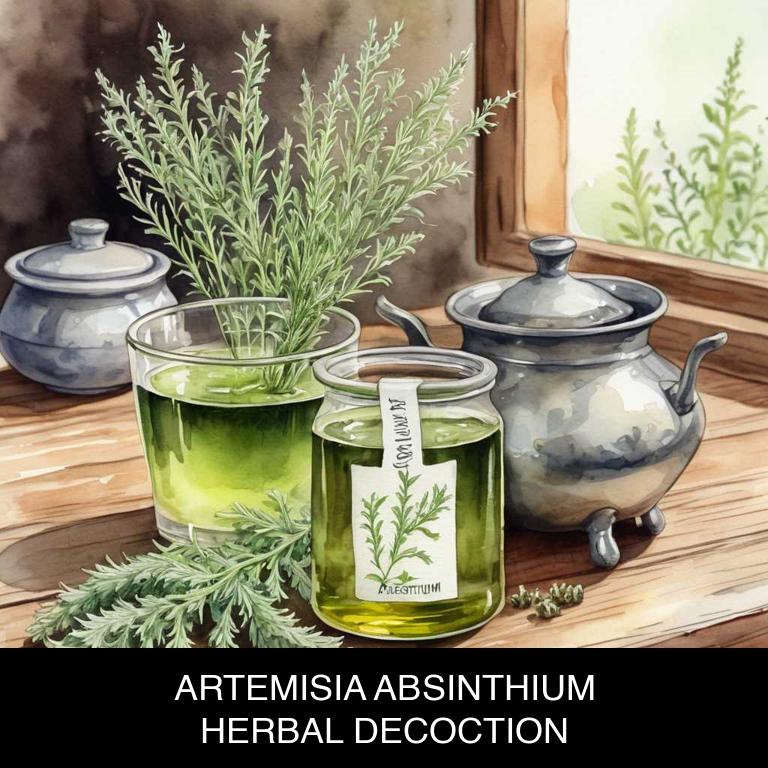
Medicinal Constituents
The list below shows the primary medicinal constituents in Artemisia absinthium decoctions that help with open wounds.
- Thujone: A terpenoid ketone found in Artemisia absinthium, thujone has antimicrobial properties, which can help prevent infection in open wounds by inhibiting the growth of bacteria, fungi, and other pathogens.
- Casticin: A flavonoid glycoside, casticin in Artemisia absinthium decoctions has anti-inflammatory and antioxidant properties, which can aid in wound healing by reducing inflammation and oxidative stress, promoting tissue repair and regeneration.
- Artabsin: A sesquiterpene lactone, artabsin found in Artemisia absinthium has antimicrobial and anti-inflammatory activities, which can help protect open wounds from infection and promote wound healing by reducing inflammation and modulating the immune response.
Parts Used
The list below shows the primary parts of wormwood used to make decoctions for open wounds.
- Leaves: Leaves are the most commonly used part due to their antiseptic and anti-inflammatory properties, which help to prevent infection and promote healing in open wounds.
- Stems: Stems are used due to their astringent properties, which help to stop bleeding and reduce inflammation in open wounds.
- Roots: Roots are used due to their antimicrobial properties, which help to prevent infection and promote healing in open wounds.
Quick Recipe
The following recipe gives a procedure to make a basic wormwood for open wounds.
- Harvest the artemisia absinthium leaves and flowers at dawn when the dew is still present.
- Dry the harvested material in a warm well-ventilated area for 1-2 weeks.
- Crush 2-4 teaspoons of dried leaves and flowers into a fine powder using a mortar.
- Steep 1 teaspoon of the powdered herb in 1 cup of boiling water for 5-10 minutes.
- Strain the decoction using a cheesecloth or a fine-mesh sieve to remove the solids.
7. Taraxacum officinale
Dandelion decoctions helps with open wounds because of its rich antioxidant and anti-inflammatory properties.
The decoction's high levels of vitamin A, C, and E help to stimulate collagen production, promoting healthy tissue growth and wound closure. Additionally, dandelion's antimicrobial properties prevent bacterial growth and infection, reducing the risk of complications and promoting a faster healing process.
The decoction's gentle, soothing nature also helps to reduce inflammation and discomfort, creating an ideal environment for optimal wound repair.

Medicinal Constituents
The list below shows the primary medicinal constituents in Taraxacum officinale decoctions that help with open wounds.
- Taraxasterol: This triterpenoid saponin has antimicrobial properties, which help to prevent infection and promote wound healing by inhibiting the growth of bacteria and other pathogens.
- Quercetin: As a flavonoid phenolic compound, quercetin exhibits anti-inflammatory and antioxidant properties, which reduce oxidative stress and inflammation in the wound area, promoting a conducive environment for healing.
- Luteolin: This flavone phenolic compound has been shown to possess antimicrobial and anti-inflammatory activities, which contribute to the prevention of infection and the promotion of wound healing by reducing the production of pro-inflammatory mediators.
Parts Used
The list below shows the primary parts of dandelion used to make decoctions for open wounds.
- Leaves: These are used for their anti-inflammatory and antimicrobial properties to reduce infection and promote healing.
- Roots: The roots are used for their antiseptic and astringent properties to help stop bleeding and prevent infection.
- Buds: The buds are used for their antiseptic and antimicrobial properties to promote healing and prevent infection in open wounds.
Quick Recipe
The following recipe gives a procedure to make a basic dandelion for open wounds.
- Gather taraxacum officinale roots and stems from a trusted herbal source weighing approximately 20 grams total.
- Chop the taraxacum officinale roots and stems into small pieces to increase their surface area.
- Combine the chopped taraxacum officinale pieces with 1 liter of cold water in a saucepan.
- Bring the water to a boil then reduce heat to a simmer for 10 to 15 minutes.
- Strain the taraxacum officinale decoction through a cheesecloth or a fine-mesh sieve into a clean container.
8. Cinchona officinalis
Jesuit's bark decoctions helps with open wounds because of its potent antimicrobial properties, which inhibit the growth of bacteria, viruses, and fungi that can cause infection.
The decoction's antiseptic and anti-inflammatory compounds reduce swelling, promote healing, and soothe discomfort. Additionally, the decoction's ability to stimulate blood flow enhances tissue repair and promotes collagen synthesis, helping to close wounds more efficiently.
Overall, Jesuit's bark decoctions provide a natural and effective way to accelerate wound healing and promote healthy tissue regeneration.
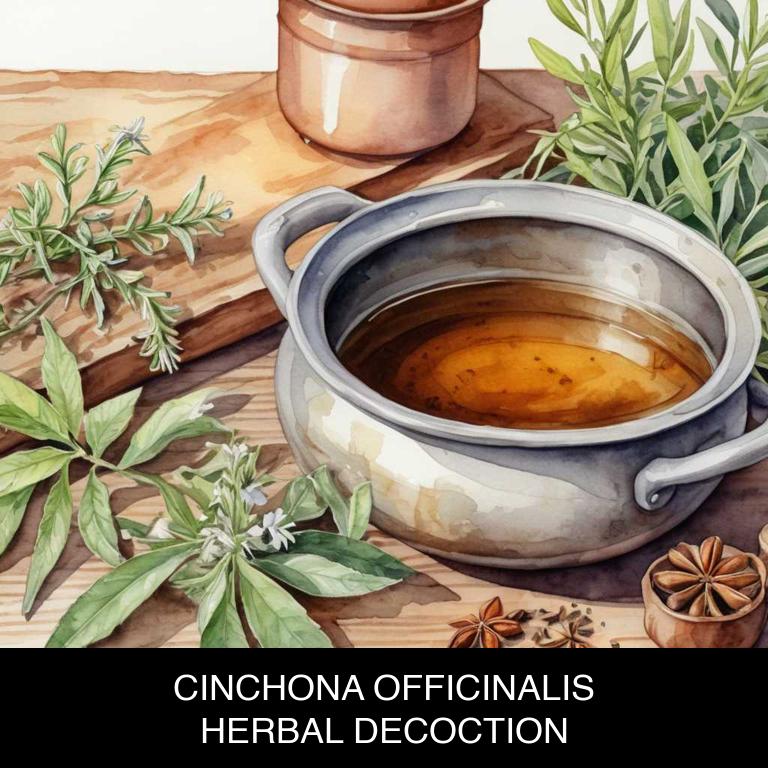
Medicinal Constituents
The list below shows the primary medicinal constituents in Cinchona officinalis decoctions that help with open wounds.
- Quinine: It acts as an antimicrobial agent to prevent infection and promote wound healing by inhibiting the growth of bacteria and other pathogens.
- Quinovic acid: It exhibits anti-inflammatory properties, which help reduce swelling and promote a conducive environment for wound healing by inhibiting the production of pro-inflammatory enzymes.
- Cinchonine: It possesses antimicrobial and antiseptic properties, which aid in preventing infection and promoting wound healing by inhibiting the growth of bacteria, fungi, and other microorganisms.
Parts Used
The list below shows the primary parts of jesuit's bark used to make decoctions for open wounds.
- Barks: The barks of Cinchona officinalis are widely used due to their high content of quinine and other alkaloids that possess antimicrobial properties, helping to prevent infection in open wounds.
- Leaves: The leaves are used because they contain cinchonine, an alkaloid with antiseptic and anti-inflammatory properties that aid in wound healing and reduce the risk of infection.
- Stems: The stems of Cinchona officinalis are used due to their content of quinine and other alkaloids that have antimicrobial and anti-inflammatory effects, promoting wound healing and preventing infection.
Quick Recipe
The following recipe gives a procedure to make a basic jesuit's bark for open wounds.
- Harvest 100g of dried cinchona officinalis bark and rinse with cold water to remove any impurities.
- Boil 500ml of water in a saucepan and add the cinchona bark for 10 minutes of steeping time.
- Reduce heat and simmer for another 10 minutes to allow the bark to infuse fully.
- Strain the decoction using a cheesecloth or a coffee filter into a clean container.
- Store the decoction in the refrigerator for up to 24 hours before consuming it chilled.
9. Plantago major
Plantain decoctions helps with open wounds because of its anti-inflammatory, antimicrobial, and antiseptic properties.
The plantain herb contains compounds that reduce swelling and promote healing by improving blood flow to the affected area. Its antibacterial and antifungal agents also inhibit the growth of microorganisms that can cause infection, while its astringent properties help to dry out excess fluid and prevent further damage.
This natural remedy promotes a healthy environment for wound healing, reducing the risk of complications and promoting faster recovery.
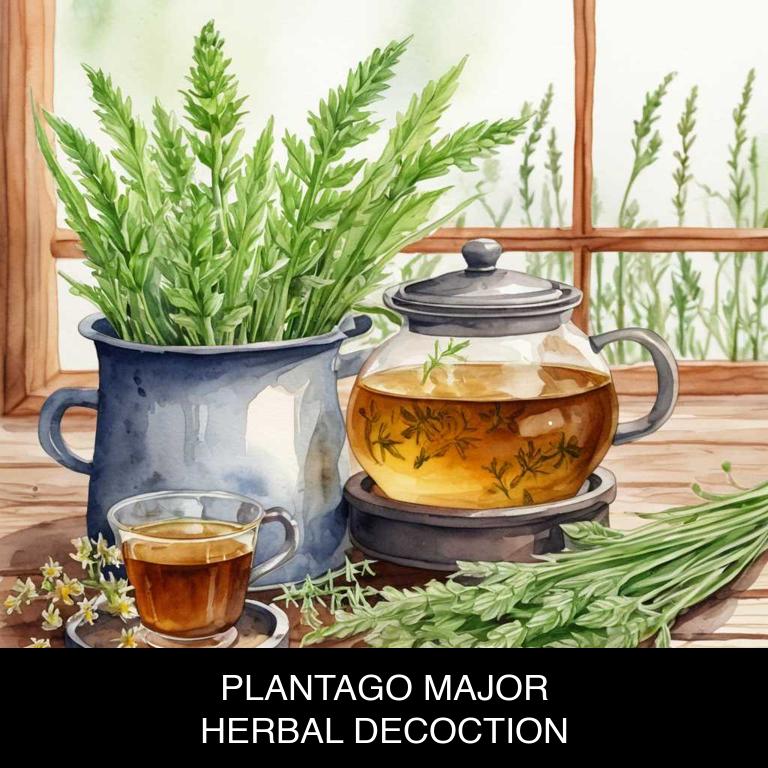
Medicinal Constituents
The list below shows the primary medicinal constituents in Plantago major decoctions that help with open wounds.
- Phenolic acids: Help to reduce inflammation, prevent bacterial growth, and promote wound healing by exhibiting antimicrobial and antioxidant properties.
- Alkaloids: Contribute to the wound-healing process by reducing inflammation, promoting tissue repair, and inhibiting bacterial growth due to their antimicrobial and anti-inflammatory properties.
- Saponins: Assist in the wound-healing process by reducing inflammation, promoting the formation of scar tissue, and preventing bacterial growth due to their antimicrobial and anti-inflammatory properties.
Parts Used
The list below shows the primary parts of plantain used to make decoctions for open wounds.
- Leaves: They are used due to their high mucilage content, which helps to promote healing and protect the wound from infection.
- Roots: They contain compounds with antimicrobial properties, which aid in preventing infection and promoting the recovery of the wound.
- Seeds: They contain plantain oil, which has anti-inflammatory properties, reducing swelling and promoting healing in the affected area.
Quick Recipe
The following recipe gives a procedure to make a basic plantain for open wounds.
- Gather 2 tablespoons of dried plantago major leaves and flowers to make the decoction.
- Combine the gathered plantago major with 2 cups of boiling water in a saucepan.
- Simmer the mixture for 5-7 minutes over low heat to extract active compounds.
- Strain the decoction through a cheesecloth or fine-mesh sieve into a bowl.
- Store the prepared decoction in the refrigerator for up to 3 days or freeze for later use.
10. Aloe vera
Aloe decoctions helps with open wounds because they provide a natural and effective way to promote healing.
The gel-like substance inside the aloe plant contains compounds that have anti-inflammatory, antimicrobial, and antioxidant properties. These properties help reduce swelling, prevent infection, and protect the wound from further damage, creating a favorable environment for the body's natural healing process.
As a result, aloe decoctions can accelerate the wound-healing process, reducing the risk of scarring and promoting healthy tissue regeneration.
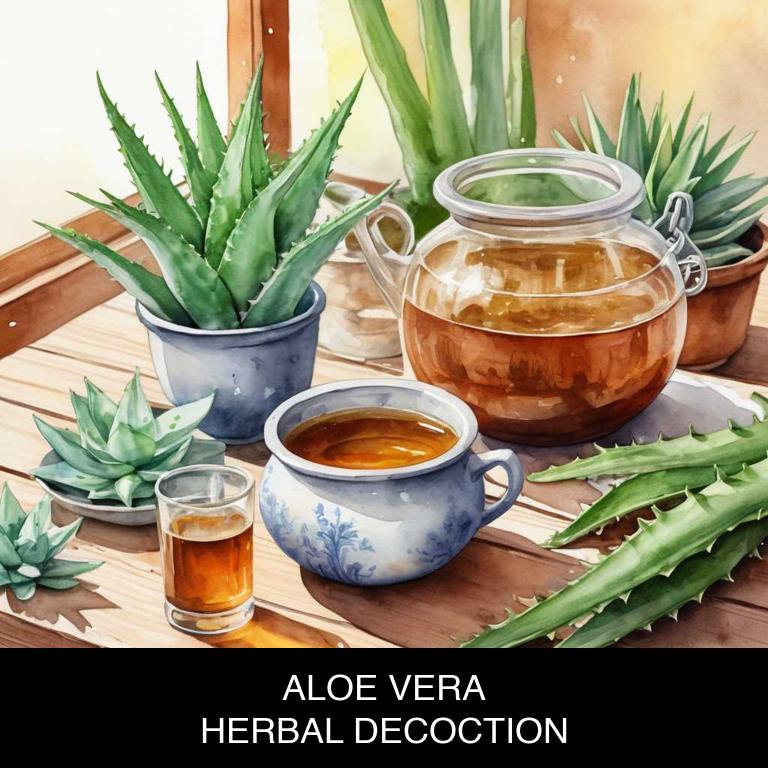
Medicinal Constituents
The list below shows the primary medicinal constituents in Aloe vera decoctions that help with open wounds.
- Glycoproteins: These complex molecules help with wound healing by promoting tissue regeneration, reducing inflammation, and enhancing the growth of new skin cells.
- Acemannan: A type of polysaccharide, Acemannan stimulates the immune system, enhances wound healing by promoting collagen synthesis, and has antimicrobial properties to prevent infection.
- Anthraquinones: These compounds have anti-inflammatory and antimicrobial properties, which help to reduce redness, swelling, and the risk of infection in open wounds, while also promoting wound closure and tissue repair.
Parts Used
The list below shows the primary parts of aloe used to make decoctions for open wounds.
- Leaves: Aloe vera leaves are commonly used due to their high concentration of gel, which has anti-inflammatory and soothing properties that aid in wound healing.
- Barks (although more often its inner gel from the leaves is used, but sometimes it is also the barks that are used): Aloe vera barks or the outer layer of the stem contain compounds that exhibit antimicrobial and antiseptic properties, helping to prevent infection in open wounds.
Quick Recipe
The following recipe gives a procedure to make a basic aloe for open wounds.
- Choose fresh aloe vera leaves with thick green skin and take 50g of them for the decoction.
- Cut the aloe vera leaves into small pieces to release their gel and juice.
- Boil 1 liter of water in a pot over high heat for 5 minutes.
- Add the cut aloe vera pieces to the boiling water and simmer for 30 minutes.
- Strain the decoction through a cheesecloth or fine-mesh sieve into a clean container.
What is the best combination of herbal decoctions to use for open wounds?
The best combination of herbal decoctions that help with open wounds is a blend of calendula, aloe vera, and plantain.
Calendula promotes tissue repair and reduces inflammation, while aloe vera accelerates healing and soothes pain. Plantain helps to prevent infection and promote collagen production. When combined and applied topically, these decoctions create a potent healing solution.
Additionally, consuming a decoction made from echinacea and yarrow can help boost the immune system and prevent further complications.
What ailments similar to open wounds are treated with herbal decoctions?
Ailments similar to open wounds that are treated with herbal decoctions are skin ulcers, burns, eczema, acne, and other dermatological conditions.
Herbal decoctions rich in anti-inflammatory and antimicrobial properties help promote healing, reduce pain, and prevent infection.
Common herbs used include turmeric, ginger, chamomile, and calendula, which are often combined with other botanicals to create a customized remedy for each individual case.